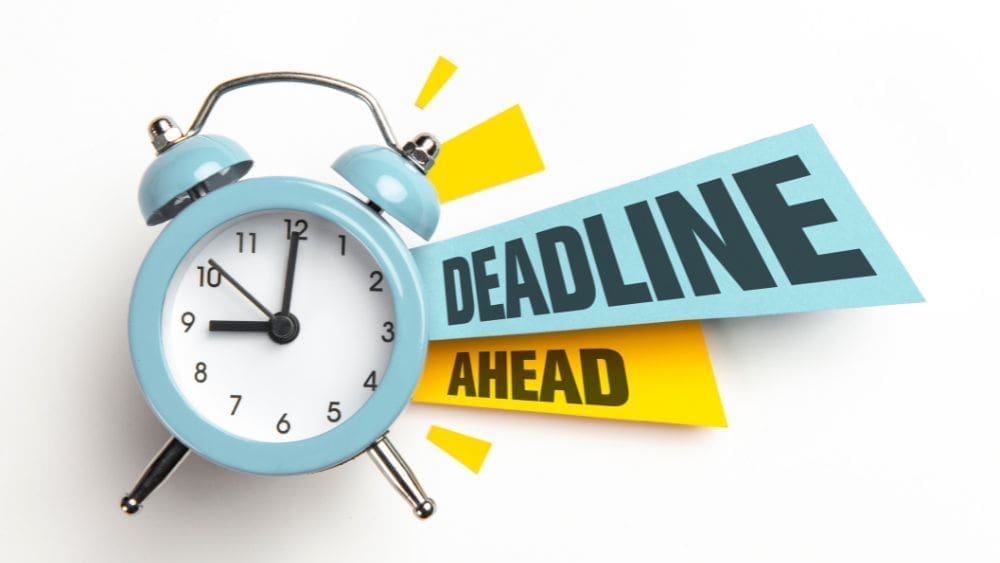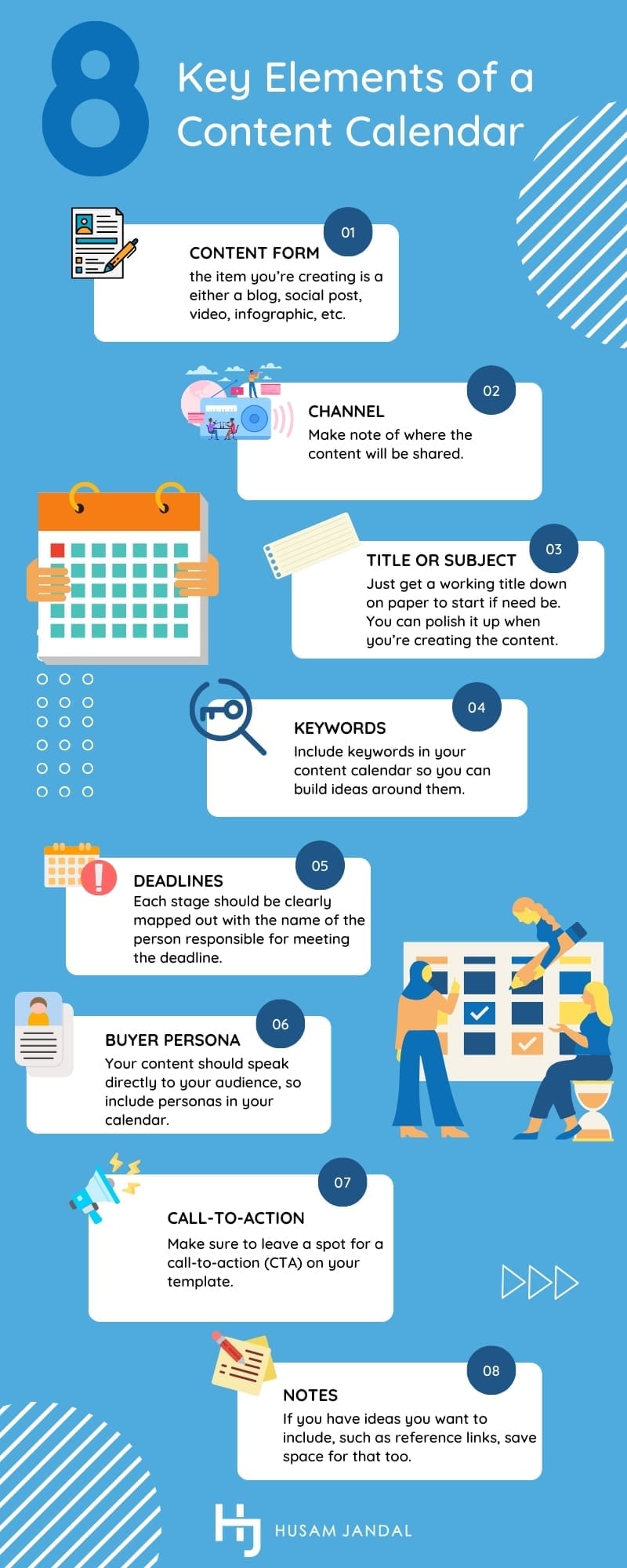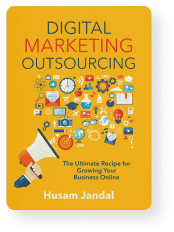
If you’re not already using a content marketing calendar, it will radically transform the way your marketing team operates and dramatically improve your results. Best of all, it doesn’t have to take much time or cost a lot of money to make one. Give me a few minutes of your time, and I’ll walk you through the basics, so you can get started creating your content calendar right away.
Digital Marketing Content Calendar Defined
A content marketing calendar is a tool that helps you manage your content marketing strategy better. While a digital marketing calendar, or online marketing calendar, plans out all of your marketing efforts for the year, a content calendar focuses solely on the content aspect of your marketing strategy. Think of it as a creation and publishing schedule for all the pieces of content your marketing team generates. A content marketing schedule is a detailed document that guides the daily activities of savvy marketers.
It’s different than an editorial calendar, which is more of a high-level overview of the themes and topics an organization plans to cover over an extended period. Many teams will develop an editorial calendar a full year in advance or even use the same editorial calendar template year after year.
For example, let’s say you run a travel company. Your editorial calendar might say you plan to cover romantic getaways in January to get a head start on Valentine’s Day, then tropical destinations the next month, spring break trips the following month, and so forth. Then, your content calendar for January would list blogs on the topic of romantic getaways, such as international destinations for couples, Valentine’s staycations, and so forth. You’ll also outline corresponding social posts, your digital newsletter topics, and any other pieces you plan to release.
Benefits of Using a Content Calendar for Content Creation
A good calendar is the central component of a high-quality content strategy. It helps you plan content in meaningful ways and use your time wisely. I’ll dig into the benefits a bit more below. Businesses in highly regulated industries, like digital marketing for financial services, can particularly benefit from structured content calendars to align marketing efforts with compliance requirements and audience needs.
Content Calendars Help You Think More Critically About Your Goals and Resources
Writing blog posts for visibility and brand awareness? You should be writing one to four posts per week, according to HubSpot. Writing them for SEO value? That’s three to five.
If you’re leveraging social media marketing, each platform has specific guidelines for frequency. LinkedIn, for example, tends to do best with five posts per week, no more than once per day per HubSpot. Facebook is roughly the same, and Twitter… as many posts as you can muster. Guidelines for platforms like YouTube, Instagram, and Pinterest vary, simply because it takes time to create high-quality content. It’s better to put out a single top-tier video each month than it is to release four low-quality ones.
Then, there are marketing emails and email newsletters. Nearly 90 percent of your customers want to hear from you at least monthly, per Marketing Sherpa, and just over 60 percent say at least weekly. If you exceed their optimal number of sends, you run the risk of getting unsubscribes, so it’s generally best to stop there unless you have something incredibly important to convey.
Exhausted already? We haven’t even gotten into the best times to post and all the other mediums you could potentially be using in your content marketing plan. But, consistency is key to maintaining engagement and ensuring your content marketing efforts produce results.
When you outline all the content types you need in advance, it’s much easier for you to decide how to allocate your time and use it effectively. Without this crucial resource, it’s very easy to lose track of content ideas or forget to save enough time for content creation.
All Your Marketing Campaigns Can Feed Into One Another
It’s often said that people need to hear something seven times before they retain it. That might not be a proven fact, but we know repetition is essential for memory recall, and your prospects are being hit with an endless stream of information all day, every day. With that in mind, you need to ensure your messaging is consistent and use the same messaging repeatedly. Your content calendar will help you do just this.
The other big thing is that it’s much easier to create several pieces of related content at once than it is to come back to an idea later. You shouldn’t be writing a single blog on a topic and then move on. The details of that blog can be converted into social posts, emails, and even a video. When you work in groups like this, you’re more efficient, and your audience will naturally hear the same core concepts, plus they’ll have access to your expert content on whichever medium suits them.
To make your content go even further, do some keyword research and highlight which keywords you plan to cover on your content calendar too. This way, you’ll naturally build strong SEO across a wide variety of topics that relate to your business.
Enhanced Team Collaboration and Communication
A content calendar fosters improved communication and collaboration among team members. It acts as a centralized platform where every content creator, from writers to social media marketers, can view upcoming content, deadlines, and responsibilities. This transparency ensures that everyone on your team is aligned with the content strategy and individual marketing activities. It facilitates seamless collaboration, reducing misunderstandings and ensuring that content is produced and published efficiently. The content calendar helps in organizing brainstorming sessions, where team members can contribute ideas, enhancing the diversity and creativity of the content produced.
Ownership of Duties is Clear
Once your content strategy is up and running, and your team is accustomed to working together, it will be like a fine-tuned machine. However, in the early days, it’s common to have some confusion over who is creating which piece of content or where one job ends and the next one starts. A good content calendar will outline all the jobs and who’s responsible for what. This eliminates confusion and can go a long way to ensuring you have the right resources and that each person has enough time for their individual tasks.
Deadlines Are More Easily Met

If you’re managing a content marketing strategy alone, having deadlines for each stage of content creation will help keep you on track and hold you accountable. However, most growth-minded businesses have several people working on content at once. For example, suppose you’re releasing a single blog. In that case, you’ll have one person identifying which keywords to use, a writer, perhaps a graphic designer, an editor or manager, and possibly others reviewing the content for accuracy and tone. Each person needs to stay on track. A content calendar helps immensely with this and lets the team see the bigger picture, which can also boost adherence to deadlines.
You Can Track Your Marketing Budget and Results Better
In general, small businesses reinvest around eight percent of their annual revenue into marketing, according to HubSpot. It’s a small amount, so it’s important to make every dollar count. First, find out how much it costs to make different content types and track that alongside your projects on your calendar. Then, watch your engagements, leads, and conversions to see which types of content and which topics perform best. From there, you can turn up the volume on the things that are working and let go of the things that aren’t to get more return from your marketing budget over time.
Best Practices for Using a Content Marketing Calendar Effectively
Now that you understand the basics of content calendars and how they help, let’s explore a few things you can do to use yours more effectively.
Use a Content Calendar Tool
While you can use a specialized platform or content calendar template, basic spreadsheets in Google Sheets or Excel can work just fine for smaller marketing teams. Google Calendar works well for some, too. Consider how you and your team work best and choose a system that helps you visualize the data in a way that’s easy to follow.
Understand the Key Elements of a Content Calendar
No matter which tool you use, all good content marketing calendar templates include the same critical elements.

- Content Form: Is the item you’re creating a blog, social post, video, infographic, or something else?
- Channel: Make note of where the content will be shared.
- Title or Subject: Just get a working title down on paper to start if need be. You can polish it up when you’re creating the content.
- Keywords: To get more traffic from your content, it should be keyword optimized. Include keywords in your content calendar so you can build ideas around them, and your work will read more naturally.
- Deadlines: Again, each stage should be clearly mapped out with the name of the person responsible for meeting the deadline.
- Buyer Persona: Your content should speak directly to your audience, so include personas in your calendar. This primes the person creating the content and helps ensure you’re not overlooking any of your personas in your content strategy.
- Call-to-Action: Even if your goal is to engage readers in a non-sales way, you should still leave them with a next step and measure how many people take that step. Make sure to leave a spot for a call-to-action (CTA) on your template.
- Notes: If you have ideas you want to include, reference links, inspiration links, or anything else the team needs to know, save space for that too.
Add Items to Your Calendar
Start with a broad approach and then work your way down to the details. That means you’ll need to begin with your objectives and budget, nail down how much content you intend to create and your publishing schedule, build out an editorial calendar or outline of broad topics you want to cover, then start brainstorming content that fits into those buckets.
Schedule Every Part of the Creation Process
Remember, some pieces of content can take weeks or more to create and require coordinating several specialists’ work. Give yourself ample time for the creation process and plan to have the work completed and staged at least a week or two in advance. You may need a separate tool for this. Check out “12 Epic Marketing Project Management Platforms to Boost Your Team’s Success” to learn more about what’s on the market today and find the best fit for your needs.
Perform Regular Content Audits
The integration of a content calendar in your marketing program not only enables a more analytical approach to content creation but also facilitates regular content audits. The calendar allows for the meticulous tracking and analysis of the performance of each piece of content, from social media posts to blog articles. Marketers can assess which content types and topics are resonating with the audience, leading to informed, data-backed decisions. During content audits, every piece of the organization’s content is reviewed, noting its performance, the targeted persona, and its role in the customer journey. This process reveals content that is performing well, offering insights for duplication of success, and identifies gaps in the content strategy. The combination of analytical insights and audit insights ensures that future content is not only tailored to meet the specific needs and preferences of the audience but is also optimized for performance, enhancing the overall effectiveness of content marketing efforts.
Get Help with Your Digital Marketing Processes
Content calendars are one of my favorite tools, and I use them each time I serve a client as a business and digital marketing consultant. It’s a fundamental strategy that ensures the company gets maximum return on investment and the team is working together cohesively. But, not every small business owner has time to put a performance-driven content plan or content marketing schedule together. Perhaps they don’t know where to start, which channels to use, when to post, how to find talent, or the myriad of other things a digital marketing content calendar needs. If you run a small or midsize business and want to grow, I can help. Contact me for a complimentary consultation.





































































